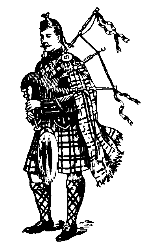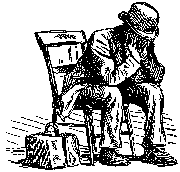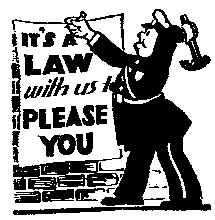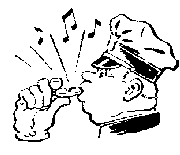Billy-Goat Guff, Chops, The Despond of Slew, and 23 Skiddoo, Kiddo.
Comrade Doe?
Dear Evan: I am a goat rancher, originally from Texas and now in Oklahoma. There have
been a lot of questions on a mailing list to which I belong about the difference in calling a male goat
"billy" or "buck" and a female "nanny" or "doe." I suggested that it was colloquial as I can only
remember them being referred to as "billys" and "nannies" in Texas. Many of my dairy goat friends
took exception to this. They allow that "billy" and "nanny" refer to meat and brush goats and buck
and doe refer to highly bred dairy animals. Who is right? If the transition to "buck" and "doe" is just
another example of our "political correctness" as I suspect, it would be nice to know. -- Ed Jackson,
via the internet.
 Before we begin exploring the finer points of goat nomenclature, I suppose it would be a good
idea to explain what Mr. Jackson means by "mailing list." There are thousands of e-mail mailing lists
on the internet, each of which serves as a forum where devotees of a particular subject or avocation
can discuss topics of mutual interest, such as, well, goat nomenclature. One way to find the mailing list of your particular dreams is by searching at The Liszt of Lists.
Before we begin exploring the finer points of goat nomenclature, I suppose it would be a good
idea to explain what Mr. Jackson means by "mailing list." There are thousands of e-mail mailing lists
on the internet, each of which serves as a forum where devotees of a particular subject or avocation
can discuss topics of mutual interest, such as, well, goat nomenclature. One way to find the mailing list of your particular dreams is by searching at The Liszt of Lists.
Meanwhile, back at goats, I don't know why anyone would shun the names "billy" and
"nanny" in favor of the drab "buck" and "doe" (which can refer to the males and females of many
species, including rabbits and shad, for Pete's sake), but I have my suspicions. I don't think it's a
question of "political correctness" (though it seems to be a close relative of that illness). I think it's
probably a result of the dairy goat industry's quest for respectability. After all, when most people (or
at least most people in urban America) hear the term "billy goat"or "nanny goat," visions of The
Beverley Hillbillies and tin cans come to mind -- not what the Wall Street types would consider a good
"investment environment." Personally, my vote goes to "billy" and "nanny," but then again, I prefer
goats to stockbrokers.
Noodles and Chops
Writing a column such as this is, as anyone who does it is keenly aware, a collaborative effort.
No matter how neatly I may think I have answered a reader's question, I find that there is almost
always someone out there who has the experience or background to fine-tune my answer.
 Early last year, for instance, I answered a reader's query about the phrase "to bust someone's
chops," which means, as the Random House Historical Dictionary of American Slang puts it, to
"harass by the forcible exertion of one's authority," often by insisting on obedience to pointless rules or
orders. Army recruits, for example, assigned by their sergeant to clean their barracks using only
toothbrushes, are having their "chops busted." I noted that the phrase is of relatively recent origin, first
appearing in print only in the 1950's, and theorized that "chops" in this case probably harks back to its
original 16th century slang meaning of "mouth" or "lips," a "bust in the chops" being the equivalent of
a punch in the mouth. So far, so good, but it turns out that I may have overlooked a very interesting
bit of the history of "chops."
Early last year, for instance, I answered a reader's query about the phrase "to bust someone's
chops," which means, as the Random House Historical Dictionary of American Slang puts it, to
"harass by the forcible exertion of one's authority," often by insisting on obedience to pointless rules or
orders. Army recruits, for example, assigned by their sergeant to clean their barracks using only
toothbrushes, are having their "chops busted." I noted that the phrase is of relatively recent origin, first
appearing in print only in the 1950's, and theorized that "chops" in this case probably harks back to its
original 16th century slang meaning of "mouth" or "lips," a "bust in the chops" being the equivalent of
a punch in the mouth. So far, so good, but it turns out that I may have overlooked a very interesting
bit of the history of "chops."
Reader Sara Lipowitz of Champaign, IL, notes:
Musicians tend to use the word "chops" in its original meaning, referring to the lips or mouth.
Thus, "busting your chops" means to play your instrument to the point of overplaying it, especially if
it's a wind or brass instrument, as in, "I busted my chops on that piece." It's also used to denote skill:
"He has the chops," or "It takes good chops to play this piece." "Chops" is also applied to musicians
who don't play wind or brass instruments, though it always sounds strange to my ear to hear someone
say of a drummer, "He has the chops."
A Flea and a Fly in a Flue....
Dear Evan: You were complaining about the number of people who write to you about words
ending in "gry", and referred them to "a whole slew" of examples. Naughty! naughty! A lot of people
misuse words that sound alike, such as "slough" and "slew." "Slough" is literally a large swamp full
of mud and water, and perhaps other disgusting things; you may refer to a "slough-full" of something,
meaning a very large amount or number of things. But "slew" is a verb meaning "to move rapidly
sideways," and it is meaningless to speak of a "slew full" of something, or of something "sloughing"
from here to there. And "slue" for either version is just plain misspelled. At least that's my opinion.
I'd like to see yours. -- Wallace Riley, via the internet.
 I am of the opinion, after spending some time plowing through dusty dictionaries on an exceptionally hot and humid afternoon, that this whole
question is beginning to remind me of a large swamp full of mud, water, and confusion. I shall
attempt, therefore, to be more methodical than usual in my answer, all of which is based on the newly
minted (thus un-dusty and very nifty to boot) Random House Compact Unabridged Dictionary.
I am of the opinion, after spending some time plowing through dusty dictionaries on an exceptionally hot and humid afternoon, that this whole
question is beginning to remind me of a large swamp full of mud, water, and confusion. I shall
attempt, therefore, to be more methodical than usual in my answer, all of which is based on the newly
minted (thus un-dusty and very nifty to boot) Random House Compact Unabridged Dictionary.
"Slough" is, as you note, a noun meaning "swamp" or "muddy ditch," and comes from an Old
High German word meaning "ditch." "Slough" is, however, pronounced to rhyme with "cow" in most
uses, except when it refers to an pool, inlet or pond, when it is pronounced "sloo." When "slough" is
pronounced "sluff," it means to shed one's skin (as snakes do) or to dismiss something from
consideration ("to slough off the suggestion").
"Slew," on the other hand, can mean all sorts of things, and is always pronounced "sloo." Used
as a verb, "slew" means a kind of motion (around a central axis, actually, without lateral movement),
and is sometimes spelled "slue." As a noun, however, "slew" does mean "a large number of things,"
and comes from the Irish word "sluagh," meaning "crowd." Unfortunately, "slew" can also mean
"slough" (swamp), as well as being the past tense of "slay." Does anyone have an aspirin?
What this all adds up to is that in using "slew" to mean a large number of words I was definitely in the
ballpark, although "a whole slew" is, I'll admit, a bit redundant.
(Lest I be accused of leaving you all hanging, the rest of the ditty serving as the title of that piece goes:
Were imprisoned, so what could they do?
Said the Flea, "Let us fly!"
Said the Fly, "Let us flee!"
So they fled through a flaw in the flue.)
Besides, I stood on that corner for two days myself and nothing happened.
Dear Evan: Greetings. I am looking for some verification of an expression born during the
"roaring twenties." "Twenty three skidoo!" is the expression. I`ve checked a plethora of sources
including Bartlett's, etc., yet still no avail! If you can help me out with my quest, it would be most
appreciated. -- Richard McDonald, Canada, via the internet.
Well, I can certainly help you out with your quest, but I can't promise you a definitive answer
because there isn't one. It's not for lack of interest in the phrase among etymologists, however. The
puzzle of "twenty-three skiddoo," which can mean "let's go, "get lost," "aha!," or a variety of other
things, is one of the classic word-origin questions, and nearly every authority has at least one theory. Incidentally, although most people who
have heard "twenty-three skiddoo" regard it as the quintessential silly slang of the "Roaring Twenties,"
the phrase actually appeared a bit earlier, just before World War One, so it was relatively old hat as
slang goes by the 1920's.
 The "skiddoo" part is fairly easy to trace, and is almost certainly a variant of "skedaddle,"
meaning "to depart in haste." The "twenty-three," however, is a bit more obscure. My parents, in their
Morris Dictionary of Word and Phrase Origins, reported two of the more popular theories. The first
traces it to a popular stage production of Dickens' "A Tale of Two Cities" in which a character
counted off the number of victims being guillotined in the final act, with the hero, Sydney Carton,
being the twenty-third and last. The intonation "twenty-three!" was the last line of the play, and was
subsequently adopted by Broadway regulars as jocular slang for "that's it -- let's get out of here."
The "skiddoo" part is fairly easy to trace, and is almost certainly a variant of "skedaddle,"
meaning "to depart in haste." The "twenty-three," however, is a bit more obscure. My parents, in their
Morris Dictionary of Word and Phrase Origins, reported two of the more popular theories. The first
traces it to a popular stage production of Dickens' "A Tale of Two Cities" in which a character
counted off the number of victims being guillotined in the final act, with the hero, Sydney Carton,
being the twenty-third and last. The intonation "twenty-three!" was the last line of the play, and was
subsequently adopted by Broadway regulars as jocular slang for "that's it -- let's get out of here."
Another theory, which has been widely reported as fact but which strikes me as highly
improbable, traces the phrase to the corner of Twenty-third Street and Broadway in New York City,
location of the famous Flatiron Building and, for purposes of this story at least, a very windy
intersection. It is said that the young men of the 1890's would gather at this corner in hopes of seeing
a lady's dress blown up by the wind, a practice which the local police would discourage with the gruff
order "Twenty-three skiddoo!"
 Since neither of these theories strikes me as very believable (especially not the "windy corner" one), I was pleased to find that the late Eric Partridge devoted nearly a full page to "twenty-three
skiddoo" in his Dictionary of Catch Phrases (reprinted by Scarborough House in 1992). After
recounting the popular theories about the phrase, the eminent etymologist Partridge reported that one
of his correspondents felt that the phrase might have had its roots in old telegraphers' code, where
common phrases were replaced by numbers. In this code, "30" sent in Morse code meant "end of
transmission" (a notation still used by journalists to signal the end of a story), "73" meant "best
regards" (still very much in use by amateur radio operators), and "23" meant "away with you!"
Since neither of these theories strikes me as very believable (especially not the "windy corner" one), I was pleased to find that the late Eric Partridge devoted nearly a full page to "twenty-three
skiddoo" in his Dictionary of Catch Phrases (reprinted by Scarborough House in 1992). After
recounting the popular theories about the phrase, the eminent etymologist Partridge reported that one
of his correspondents felt that the phrase might have had its roots in old telegraphers' code, where
common phrases were replaced by numbers. In this code, "30" sent in Morse code meant "end of
transmission" (a notation still used by journalists to signal the end of a story), "73" meant "best
regards" (still very much in use by amateur radio operators), and "23" meant "away with you!"
This, to me, seems the most likely explanation of the phrase. The old code meaning of
"twenty-three," coupled with "skiddoo," a variant of "skedaddle," perfectly conveys the meaning of
what we, today, would sum up simply as "beat it!"
Back to main page
 Before we begin exploring the finer points of goat nomenclature, I suppose it would be a good
idea to explain what Mr. Jackson means by "mailing list." There are thousands of e-mail mailing lists
on the internet, each of which serves as a forum where devotees of a particular subject or avocation
can discuss topics of mutual interest, such as, well, goat nomenclature. One way to find the mailing list of your particular dreams is by searching at The Liszt of Lists.
Before we begin exploring the finer points of goat nomenclature, I suppose it would be a good
idea to explain what Mr. Jackson means by "mailing list." There are thousands of e-mail mailing lists
on the internet, each of which serves as a forum where devotees of a particular subject or avocation
can discuss topics of mutual interest, such as, well, goat nomenclature. One way to find the mailing list of your particular dreams is by searching at The Liszt of Lists. Early last year, for instance, I answered a reader's query about the phrase "to bust someone's
chops," which means, as the Random House Historical Dictionary of American Slang puts it, to
"harass by the forcible exertion of one's authority," often by insisting on obedience to pointless rules or
orders. Army recruits, for example, assigned by their sergeant to clean their barracks using only
toothbrushes, are having their "chops busted." I noted that the phrase is of relatively recent origin, first
appearing in print only in the 1950's, and theorized that "chops" in this case probably harks back to its
original 16th century slang meaning of "mouth" or "lips," a "bust in the chops" being the equivalent of
a punch in the mouth. So far, so good, but it turns out that I may have overlooked a very interesting
bit of the history of "chops."
Early last year, for instance, I answered a reader's query about the phrase "to bust someone's
chops," which means, as the Random House Historical Dictionary of American Slang puts it, to
"harass by the forcible exertion of one's authority," often by insisting on obedience to pointless rules or
orders. Army recruits, for example, assigned by their sergeant to clean their barracks using only
toothbrushes, are having their "chops busted." I noted that the phrase is of relatively recent origin, first
appearing in print only in the 1950's, and theorized that "chops" in this case probably harks back to its
original 16th century slang meaning of "mouth" or "lips," a "bust in the chops" being the equivalent of
a punch in the mouth. So far, so good, but it turns out that I may have overlooked a very interesting
bit of the history of "chops."
 I am of the opinion, after spending some time plowing through dusty dictionaries on an exceptionally hot and humid afternoon, that this whole
question is beginning to remind me of a large swamp full of mud, water, and confusion. I shall
attempt, therefore, to be more methodical than usual in my answer, all of which is based on the newly
minted (thus un-dusty and very nifty to boot) Random House Compact Unabridged Dictionary.
I am of the opinion, after spending some time plowing through dusty dictionaries on an exceptionally hot and humid afternoon, that this whole
question is beginning to remind me of a large swamp full of mud, water, and confusion. I shall
attempt, therefore, to be more methodical than usual in my answer, all of which is based on the newly
minted (thus un-dusty and very nifty to boot) Random House Compact Unabridged Dictionary. The "skiddoo" part is fairly easy to trace, and is almost certainly a variant of "skedaddle,"
meaning "to depart in haste." The "twenty-three," however, is a bit more obscure. My parents, in their
Morris Dictionary of Word and Phrase Origins, reported two of the more popular theories. The first
traces it to a popular stage production of Dickens' "A Tale of Two Cities" in which a character
counted off the number of victims being guillotined in the final act, with the hero, Sydney Carton,
being the twenty-third and last. The intonation "twenty-three!" was the last line of the play, and was
subsequently adopted by Broadway regulars as jocular slang for "that's it -- let's get out of here."
The "skiddoo" part is fairly easy to trace, and is almost certainly a variant of "skedaddle,"
meaning "to depart in haste." The "twenty-three," however, is a bit more obscure. My parents, in their
Morris Dictionary of Word and Phrase Origins, reported two of the more popular theories. The first
traces it to a popular stage production of Dickens' "A Tale of Two Cities" in which a character
counted off the number of victims being guillotined in the final act, with the hero, Sydney Carton,
being the twenty-third and last. The intonation "twenty-three!" was the last line of the play, and was
subsequently adopted by Broadway regulars as jocular slang for "that's it -- let's get out of here."
 Since neither of these theories strikes me as very believable (especially not the "windy corner" one), I was pleased to find that the late Eric Partridge devoted nearly a full page to "twenty-three
skiddoo" in his Dictionary of Catch Phrases (reprinted by Scarborough House in 1992). After
recounting the popular theories about the phrase, the eminent etymologist Partridge reported that one
of his correspondents felt that the phrase might have had its roots in old telegraphers' code, where
common phrases were replaced by numbers. In this code, "30" sent in Morse code meant "end of
transmission" (a notation still used by journalists to signal the end of a story), "73" meant "best
regards" (still very much in use by amateur radio operators), and "23" meant "away with you!"
Since neither of these theories strikes me as very believable (especially not the "windy corner" one), I was pleased to find that the late Eric Partridge devoted nearly a full page to "twenty-three
skiddoo" in his Dictionary of Catch Phrases (reprinted by Scarborough House in 1992). After
recounting the popular theories about the phrase, the eminent etymologist Partridge reported that one
of his correspondents felt that the phrase might have had its roots in old telegraphers' code, where
common phrases were replaced by numbers. In this code, "30" sent in Morse code meant "end of
transmission" (a notation still used by journalists to signal the end of a story), "73" meant "best
regards" (still very much in use by amateur radio operators), and "23" meant "away with you!"